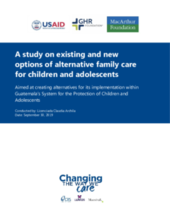This report from Changing the Way We Care reviews the range of available alternative care options in Guatemala and offers recommendations for additional alternative care modalities as well as deinstitutionalization and family preservation practices.
The report finds that, to this date, the Guatemalan System for the Protection of Children and Adolescents does not have a range of alternative care options for children who are without parental care or separated from their families. Currently, the only options are extended or foster families and residential care; therefore, this study recommends analyzing, designing, and implementing various alternative family care modalities, based on best practices identified in other countries such as the United States, Moldova, Mexico, Colombia, Costa Rica, and Argentina, which involve deinstitutionalization and family preservation. Additional options must consider the timing of the measure and implement modalities such as emergency families, temporary foster families, and long-term families, while also factoring in the type of foster care, such as community families, comparable families, families for groups of siblings, children with disabilities, and children with HIV, or families for unaccompanied migrant children, among others.
Likewise, another recommendation is to analyze Agreement 40-2010 of the Supreme Court of Justice, which places a six-month limit on placement in a foster family. This period is not always in line with the experiences and weaknesses of the System for the Protection of Children and Adolescents and can therefore work against the best interests of the child or adolescent. In many cases, six months is insufficient time to resolve the situation that led the child or adolescent to enter the protection system in the first place, or to allow the primary family to prepare for the child/adolescent’s reintegration into the family.
The report also describes the efforts made by institutions guaranteeing protection, such as the Attorney General’s Office (Procuraduría General de la Nación, or PGN, in Spanish), to change their methodology for receiving and handling cases through the Protection Plan, and to put in place administrative mechanisms that seek the solution and restitution of human rights. This, in turn, has contributed considerably to the decrease in institutionalization of children and adolescents in public or private orphanages.
It is important to begin analyzing and discussing the expansion of alternative care options and the decrease of institutionalization to guarantee the right of children and adolescents to grow up in a nurturing family environment, and that temporary housing is as close as possible to being a family environment. It is also necessary to think about policies and programs around care modalities through an intercultural lens so that the child’s placement considers and respects his or her origin, language, religion, and culture, so the family that welcomes them is as close as possible to their biological family’s environment. An example of this model can be found in the practices of the First Court for Children and Adolescents in Conflict with the Law in the department of Quetzaltenango, which considers the context’s reality when solving cases in its tribunal.
Lea la versión en español aquí.

